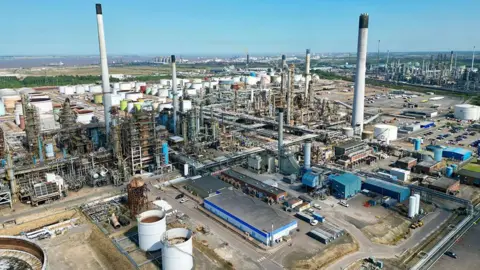### Closure of Lindsey Oil Refinery: A Significant Economic Blow
In a troubling turn of events, the Lindsey Oil Refinery located in North East Lincolnshire is set to shut down due to the government’s inability to find a buyer for the distressed facility. This situation arose after the refinery’s owner, Prax Group, entered administration, resulting in significant job losses and a potential crisis in the local economy. The refinery’s closure could put around 420 jobs at risk, impacting hundreds of workers and their families.
#### Government’s Inaction
Energy Minister Michael Shanks confirmed that as of now, “no credible offers have been made” for the entire refinery, prompting the decision to wind down operations. This news has been met with disappointment and frustration from various stakeholders, particularly local officials and the workforce. In a broader context of economic uncertainty, such a closure raises concerns about job security and economic stability in the region.
Prax Group, which purchased the refinery from the French company Total in 2021, was led by Chairman and Chief Executive Sanjeev Kumar Soosaipillai. The company found itself in dire financial straits, struggling to maintain operations and profitability. The government’s decision to step in following Prax’s administration illustrates the complexities and challenges that arise when critical infrastructure fails.
#### Local Leadership Responds
Local Conservative MP Martin Vickers described the announcement as “very bad news” and called on the government to provide support for the refinery while ongoing negotiations for potential buyers continued. He expressed concern about the importance of such facilities to the nation’s energy infrastructure, indicating that resolving the situation is crucial not only for workers but for national interests as well. Vickers highlighted the need for urgent action from the government, emphasizing that while the trouble was not directly the government’s fault, they should recognize the refinery’s strategic importance.
On the workers’ front, Mick Simpson from the Unite union pointed out that the closure could impact about 1,000 jobs when considering the associated supply chain and contractor workforce. This amplified the concern regarding job security and the broader economic repercussions of the refinery’s downfall.
#### Support for Affected Workers
Shanks reassured that all individuals currently employed at the refinery would have guaranteed jobs for the coming months as efforts were made to transition them into the growing clean energy sector. A comprehensive Training Guarantee was promised to equip the workers with necessary skills for employment in emerging industries.
Nonetheless, sentiments from the workers revealed a stark reality; many felt uncertain about their futures. Employee Dan Wood articulated the prevailing mood at the refinery as “very low,” suggesting that there are valuable questions about governmental intervention that need addressing. “Why can’t the government do what they’ve done with British Steel?” he questioned, comparing the support given to one failing industry with the situation at Lindsey.
#### Financial Struggles
A report from the Department for Energy Security revealed that the Prax Group had incurred significant losses approximating £75 million since the takeover of the refinery. Lindsey Oil Refinery is notably the smallest of the UK’s oil refineries, situated next to the larger Phillips 66 Humber refinery, which continues to operate without interruptions.
In conclusion, the closure of Lindsey Oil Refinery is not just a loss for the facility’s workers but a significant blow to the local economy and energy infrastructure. Calls for government intervention and support resonate amongst local leaders and organizations as they strive to address the imminent threat to livelihoods and sustain employment opportunities in the region. As discussions continue, the focus will remain on finding viable solutions that can secure both the workforce and the future of energy production in North East Lincolnshire.










